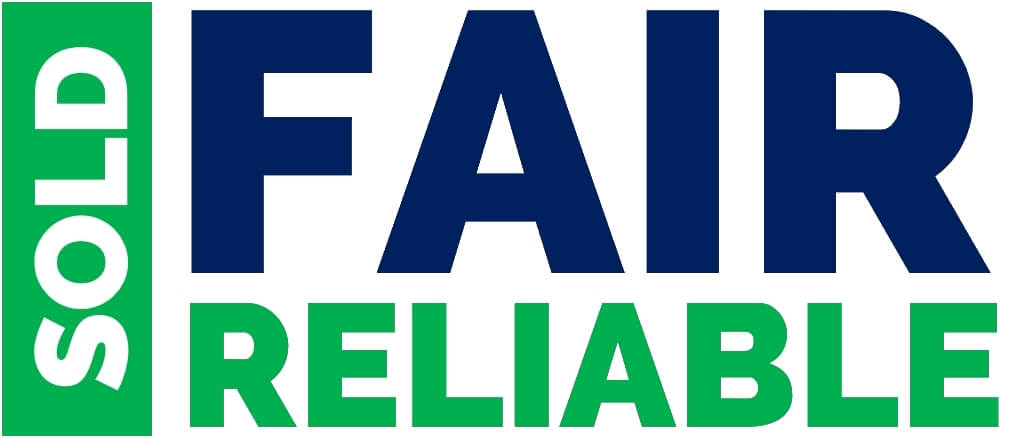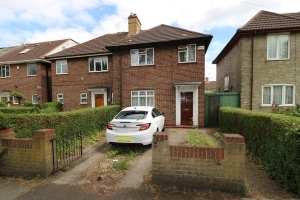What Happens if a House Doesn’t Sell at Auction?
Request a free & no-obligation auction sale price estimate
- Cost effective
No upfront fee & sell for free options - Quick
Sell your home by auction in 28 days - Secure & reliable
Legally binding sale on auction day - Fair & transparent
Sold to the highest bidder
For your peace of mind we are a member of The Property Ombudsman


Selling by auction is quick and easy. Request a no-obligation auction sale estimate for your house or flat.
- ✔ Reliable
- ✔ Fast
- ✔ Secure
Interested to learn more about the easy and efficient process of selling your property by auction?
Talk to our team on 0800 862 0206
Weighing up the pros and cons of selling at auction? This guide covers what really happens if your property doesn’t sell at its first auction, and how sellers typically move on successfully.
Selling a property at auction is widely regarded as one of the most reliable, transparent and decisive ways to sell in the UK. Traditional unconditional auctions consistently achieve success rates of 75–80%, compared to the much lower success rate – and very high fall-through rate – seen with estate agency sales.
Professional sellers rely on auction for a reason:
- Solicitors
- Banks
- Receivers
- Asset managers
- Local authorities
Auction gives them what they need: speed, certainty and a legally binding sale.
But even with auction’s strong track record, some sellers still ask:
“What happens if my house doesn’t sell at auction?”
This article gives a complete, fair and balanced explanation – including what “not selling” actually means, what really happens next, and why an unsold auction property is not the disaster that many estate agents suggest.
Understanding the Two Types of Auction
Before we explain what happens if your property doesn’t sell, it’s essential to understand the difference between on-the-day auction and extended auction. The outcome and options differ depending on which format you use.
On-the-Day Auction (the classic “under the hammer” style auction)
This is the type of auction most people are familiar with:
- Three weeks of marketing
- A set auction date
- 2–3 minutes of rapid live bidding
- If the reserve is met, contracts exchange immediately
It is fast, conclusive and decisive – but there is only one shot on the day.
Extended Auction (30-day rolling online auction)
This is becoming increasingly popular because it gives sellers more time, more exposure and more flexibility.
Key features:
- A bidding period typically lasting 30 days
- Buyers can bid at any point during the month
- If the reserve isn’t met at the end, the auction can simply roll on
- Longer time for due diligence
- Ideal for higher-value or niche properties
- Fully unconditional (unlike the Modern Method of Auction, which we do not recommend)
With extended auctions, “not selling” simply means you need a bit more time.
Quick Answer: What If My House Doesn’t Sell at Auction?
If your property doesn’t sell at auction on the first attempt, you simply continue the process – relist, extend the auction, negotiate with bidders, or re-enter the next auction.
“If your property doesn’t sell at auction, it’s not the end – you just go again.“
Unlike estate agency sales, where you can “fail slowly” over many months, auction allows you to fail quickly and adjust – without being stuck waiting on a single buyer.
What Does “Not Selling at Auction” Actually Mean?
In auction terminology, a property is “unsold” for one of three reasons.
1. Withdrawn
The auctioneer removes the lot before or during the auction.
Common reasons:
- No registered bidders
- Legal pack incomplete or missing key documents such as searches, title plan, special conditions or lease information
- Viewings not possible due to access restrictions, tenants refusing entry, safety concerns, or delays in arranging open days
- New information emerges requiring clarification, such as a defect in the title, a query raised by a solicitor, or a structural concern made known at the last minute
- Seller instructions change (for example, the seller receives unexpected private interest or needs more time to resolve outstanding issues)
A withdrawn lot does not mean the property is unsuitable for auction. In fact, withdrawal is often a protective step taken to avoid exposing a property to the market before it is fully ready. Once the issue is resolved – whether that’s completing the legal pack, granting access for viewings, clarifying a legal matter, or revisiting pricing – the property can almost always be re-entered into a later auction with a far better chance of success.
In many cases, withdrawn lots sell perfectly well at the next auction date, especially once buyers have all the information they need to bid with confidence.
This is uncommon if the guide price is correct and the legal pack is ready. However, when it does happen, it provides valuable insight into how the property is being received by the market.
“Zero bids” usually indicates:
- The property was over-priced for the auction audience, even if the reserve wasn’t especially high
- Legal pack problems that cause uncertainty – for example missing searches, missing special conditions, unclear lease terms or unresolved title issues
- Lack of access for viewings, leading buyers to feel they do not have enough information to bid confidently
- A mismatch between the property and the typical auction buyer profile (e.g. a standard residential property that might perform better with broader marketing)
- Poor timing, such as entering the auction too soon before marketing has gained traction or during a period of economic uncertainty
- Limited marketing exposure if the catalogue entry went live late or photography/video tours were not available in time
In most cases, a “no bids” situation is entirely fixable. By adjusting the guide price, improving the legal pack, offering more flexible viewing arrangements, or simply allowing a bit more time for marketing, the property can perform significantly better in the next auction cycle. Many lots that receive no bids first time around go on to sell quickly once these issues are addressed.
The most common “unsold” scenario.
There were bidders – sometimes several serious bidders – but the bidding stopped below the reserve price. This situation is far more nuanced than it first appears, and in many cases it represents a near miss, rather than a failure. When a property attracts active bidding, it proves there is demand – the only issue is the gap between the reserve and what the market is prepared to pay on the day.
This is often caused by:
- Sellers setting a higher reserve than the market will support – often because expectations are based on estate agency valuations, which can be inflated compared to auction reality
- Buyer caution due to unclear or incomplete legal details – even one missing document can cause bidders to hold back at the crucial moment
- Market conditions temporarily reducing appetite – interest rate rises, mortgage market instability, or wider economic uncertainty can make buyers more cautious
- Specialist or unusual properties needing more exposure – such as mixed‑use assets, commercial units, short‑lease flats, or properties with structural issues
- Buyers deliberately stopping short of the reserve in the hope of negotiating privately after the auction, especially if they sense the seller is motivated
A “reserve not met” scenario is very often the beginning of negotiation, not the end. When bidders have already shown genuine interest and actively competed, auctioneers will immediately move to speak with them.
This scenario frequently leads to post‑auction negotiation, where:
- Bidders are contacted straight after the lot closes
- Auction staff work to bridge the gap between the reserve and the highest bid
- Sellers may slightly adjust the reserve in light of real‑time market sentiment
- Contracts can still exchange on the same day – or within 24–48 hours – if a deal is agreed
Why Auctioneers Aim for 80%+ Success
Auctioneers do not want unsold lots.
This is why:
-
They only earn commission when the property sells – their entire business model relies on completed transactions, not listings
-
They need strong results to attract new instructions – auction success rates are one of the most important marketing tools for auction houses
-
They want full sale rooms, high energy and momentum – a high number of sales creates confidence among buyers and encourages competitive bidding
-
Unsold lots slow down the auction, reduce excitement in the room and can damage the perceived quality of the catalogue
-
Repeatedly offering unsold properties in future catalogues is something auctioneers want to avoid because it signals to the market that pricing expectations may be unrealistic
For these reasons, auctioneers will only take on a property where the reserve price is realistically set and where they feel confident that the marketing, guide price and legal pack will support a successful sale.
If the auctioneer suggests a lower reserve than you hoped, it’s not because they want to “undersell” your property – it’s because:
-
They are using real‑time market evidence and recent auction results to guide pricing
-
They know buyer behaviour and how to create competitive tension
-
A reserve that is too high can completely eliminate bidding
-
Their priority is to achieve a successful, legally binding sale for you – not simply list the property for show
A realistic reserve protects both the seller and the auctioneer. It ensures the property is priced to attract interest, encourages competitive bidding, and gives the auctioneer the best chance of securing the highest possible sale price on the day.
The Power of the Guide Price: Auctioneers’ Secret Weapon
Guide prices are deliberately set low – sometimes surprisingly low – because the strategy is rooted in how buyers behave at auction.
A low guide price acts as a powerful psychological and practical tool:
Low guide price → more interest → more enquiries → more viewings → more bidders → more competition → higher final price.
A guide price is not a valuation. It is a marketing device designed to stimulate maximum demand, widen the pool of bidders, and create competitive tension in the room (or online). When more people are bidding, the price naturally rises – often well beyond what a higher guide price would have achieved.
This strategy is so effective that the Royal Institute of Chartered Surveyors (RICS) and the Advertising Standards Authority (ASA) introduced a rule stating that the guide price must be within 10% of the reserve. This prevents auctioneers from setting misleadingly low guides, while still allowing them to use the guide strategically to drive interest.
Buyers understand the system too. They know that guide prices are intentionally attractive and that the final sale price can end up significantly higher. But the low guide still works because it:
- Encourages more people to view the property
- Brings in buyers who may not have otherwise considered it
- Generates early competition and signals good value
- Makes the auction feel more accessible, especially for new or budget‑conscious bidders
Retailers use the same tactic to draw customers in through “from £X” offers – not because everything will sell at that price, but because attractive pricing increases footfall, engagement and buyer activity. In auction, that increased activity is what pushes the final sale price to the highest level the market is willing to pay.
What Happens If a Property Doesn’t Sell at Auction?
The answer depends on whether it’s an on-the-day auction or extended auction. While both formats follow the same fundamental auction principles – competitive bidding, transparent pricing, and legally binding contracts – the way they handle an unsold property is very different. On‑the‑day auctions are fast, fixed and final, giving sellers a single decisive moment where the market sets the price. Extended auctions, on the other hand, are more flexible and forgiving, allowing bidding to continue over a longer period and giving buyers more time to complete due diligence, arrange finance, or make an informed offer.
Understanding the differences between these two formats is key, because an unsold lot in an on‑the‑day auction might simply need a second entry, a lower reserve, or a stronger legal pack, whereas an unsold lot in an extended auction may only need more time or a small adjustment in strategy. In both cases, an unsold property is not a dead end – it is market feedback that helps guide the next step toward a successful sale.
A. What Happens in an On-the-Day Auction?
Scenario 1 – No Registered Bidders (Lot Withdrawn)
If no one registers to bid:
- The lot is withdrawn
- The auctioneer preserves the listing for a future sale
- The property is usually re-entered into the next available auction
When there are zero registered bidders, it is almost always due to a practical – and fixable – issue rather than a lack of genuine interest in the property itself. Buyers rarely refuse to bid on a viable property without a reason; instead, they hold back because they don’t yet have the confidence or information they need to commit to a legally binding purchase.
Typical causes include:
- Incomplete legal documents, such as missing searches, absent lease information, unclear special conditions or delayed replies to enquiries
- Insufficient marketing time, particularly if the property was added late to the auction catalogue or if listing photography, floorplans or EPCs were delayed
- Lack of access for viewings, which is one of the biggest barriers to bidder confidence – especially if tenants are uncooperative, the property is boarded, or access has been restricted for safety reasons
- Unanswered buyer queries, where interested parties have requested further information but have not yet received clarity from the seller or solicitor
- Timing issues, such as public holidays, competing major auctions, or wider market uncertainty which temporarily suppresses registrations
The good news is that none of these issues are permanent obstacles. Once the legal pack is completed, viewing access is arranged, and buyer questions are addressed, the property can be reintroduced into a later auction with far stronger momentum.
In fact, withdrawn lots often perform better in the next auction cycle because the postponement signals to buyers that the seller is taking steps to provide full transparency and create a fair bidding environment – which increases confidence and participation.
Scenario 2 – Reserve Not Met (Lot “Available”)
If there are bidders but they don’t reach the reserve:
- The auctioneer announces the lot as “available”, signalling to the room and online bidders that the property is open to post‑auction negotiation
- They usually express surprise (“We thought this would sell today!”) — this is not theatre; it’s often genuine because active bidding shows real demand
- A member of staff invites bidders for immediate negotiation, usually taking them to a dedicated area where private conversations can take place
- Sometimes a sale is agreed within minutes of the auction ending, with contracts exchanged the same day under the same legally binding auction terms
This is one of the most dynamic moments of any auction. Buyers who hesitated during live bidding – perhaps because they didn’t want to exceed the reserve or show their full hand – often become more flexible and open in private discussion. Likewise, sellers who were initially firm on the reserve may be willing to reconsider when they see genuine interest and momentum.
If no deal is done on the day, the seller may:
- Keep the property available post-auction, allowing the auction team to continue negotiating with underbidders and fresh enquiries
- Re-enter the next auction, often with improved marketing, a completed legal pack, or a more refined reserve strategy
- Adjust the reserve based on feedback, market sentiment, or the level of interest observed during bidding
- Invite best-and-final offers from interested parties, which can sometimes result in a stronger outcome than the auction itself
It’s important to note that properties with active bidding rarely remain unsold for long. A reserve‑not‑met scenario typically means the parties were close – sometimes only a few thousand pounds apart – and with the pressure of the auction room removed, conversations flow more freely.
This is extremely common – and often successful. In fact, a significant percentage of auction sales happen after the gavel fails to fall, driven by the momentum created during live bidding.
B. What Happens in an Extended Auction?
This format is more flexible and forgiving. Unlike an on‑the‑day auction, where all the action is compressed into a few minutes of live bidding, an extended auction allows the marketing and bidding process to unfold over a much longer window. This longer timeframe gives buyers the opportunity to carry out due diligence at a more comfortable pace, arrange finance, revisit the property, or raise legal queries without the pressure of a fixed auction day looming.
In many cases, buyers who were hesitant to commit during a short auction cycle become more willing to bid when they have additional time to research the opportunity. This can lead to stronger, more confident bidding and a higher chance of reaching the reserve price. It also reduces the chance of buyers pulling out due to rushed decisions – making the whole process smoother and more reliable for everyone involved.
Option 1 – Extend the Auction
If bidding doesn’t reach the reserve by the end of the 30‑day cycle:
-
The auction simply rolls over
-
The end date is extended automatically (often by another 7–30 days)
-
Marketing continues uninterrupted across all major portals and buyer lists
-
Enquiries, viewings and legal pack downloads continue as normal
-
Interest typically builds, because buyers have more time to organise finance, investigate the legal pack and complete due diligence
-
Higher‑value, complex or commercial properties may run through multiple cycles before reaching the right buyer
-
Buyers who hesitated early on often return with stronger confidence after additional research
Momentum is not lost – in fact, it often increases because extended time on the market can turn curious browsers into committed bidders. Extended auction cycles allow the market to “catch up” with the property rather than forcing all buyers into a single, high‑pressure moment. This rolling approach means you can keep building demand until the right bidder reaches the right price.
Option 2 – Accept the Highest Bid (Reduce Reserve)
If the top bid is close to the reserve, the seller may:
-
Reduce the reserve (with their consent only)
-
Allow the auctioneer to “put the hammer down”
-
Exchange contracts immediately
-
Secure a legally binding sale without needing to wait for the next auction cycle
-
Negotiate additional terms if required (for example, clarifying completion dates or minor legal points before exchange)
This option exists because extended auctions provide space for negotiation – something the fast-paced, two‑minute bidding window of an on‑the‑day auction simply cannot accommodate.
In an extended auction, the auctioneer has the opportunity to:
-
Speak with the highest bidder in real time
-
Assess their seriousness and financial readiness
-
Go back to the seller with clear, evidence‑based advice
-
Narrow the gap between the top bid and the reserve
-
Move to an immediate exchange once both parties agree
This creates a far more fluid environment where both sides can make informed decisions without the artificial pressure of a countdown clock. Many extended‑auction sales happen this way, especially when the highest bid is close enough that a small adjustment in the reserve unlocks the sale.
In on‑the‑day auctions, the bidding window is too short for this type of negotiation – once the gavel falls without meeting reserve, the moment has passed, and negotiation must take place after the auction, not during it.
Why a Property Might Not Sell at Auction
Common reasons include:
-
Reserve set too high – When the reserve is above what the auction audience is willing to pay, buyers simply won’t engage. Even if they like the property, they won’t waste time bidding if they believe the seller’s expectations are unrealistic. A high reserve is the number one cause of an unsold auction lot.
-
Legal pack incomplete – Missing searches, absent lease documents, unclear special conditions or late solicitor responses can all trigger buyer hesitation. Auction buyers must commit to an immediate exchange, so any gap in the legal pack creates risk they’re not willing to take.
-
Restricted viewing access – If prospective buyers cannot view the property – due to uncooperative tenants, access limitations, safety issues, or delays arranging open days – they are unlikely to bid competitively. Buyers need to see what they’re buying, especially when purchasing unconditionally.
-
Guide price too high to attract bidders – A guide price that doesn’t create enough interest fails to generate the competitive tension auction relies on. If the guide is not enticing, fewer people view the property, which leads to fewer bidders and a weaker result.
-
Market uncertainties – Events such as interest rate rises, mortgage market turbulence, or wider economic caution can temporarily suppress buyer confidence. In these times, buyers become more selective and may bid more conservatively.
-
Property type (e.g. luxury homes may need longer exposure) – High‑value or unusual properties often require a longer marketing period to reach the right buyer pool. These assets can still sell very well at auction, but they occasionally need more than one cycle.
-
Title defects or lease issues not addressed – Problems such as short leases, unclear boundaries, missing rights of access, restrictive covenants or unresolved disputes can deter bidders unless fully explained or resolved in the legal pack.
The good news:
Most of these issues can be fixed quickly, and once resolved, the property often sells successfully in the next auction cycle or through post‑auction negotiation.
Strategies to Achieve a Successful Sale
1. Choose a Realistic Reserve Price
Speak openly with your auctioneer about market value and buyer appetite. A realistic reserve is the single most important factor in achieving a sale at auction. Setting it too high can immediately choke demand, discourage potential bidders and dramatically reduce the chances of competitive bidding. A well‑calibrated reserve, on the other hand, creates confidence, attracts more participants and encourages stronger bidding. Auctioneers use real‑time market data, recent comparable auction results and feedback from pre‑auction enquiries to guide sellers towards the right level.
A good reserve doesn’t undersell your property – it enables the auction to work exactly as intended: by creating competition that naturally drives the price up.
2. Prepare a Strong Legal Pack Early
Missing documents reduce confidence and suppress bidding. Buyers in unconditional auctions must be ready to exchange immediately, so they rely heavily on the legal pack. If searches, lease documents, title plans, replies to enquiries or special conditions are missing or unclear, bidders become hesitant or overly cautious. Preparing the legal pack early ensures buyers have time to review it, ask questions, and feel confident placing strong bids.
A robust legal pack can be the difference between three bidders and ten bidders – and that difference directly affects the final sale price.
3. Ensure Viewing Access
If buyers can’t view, they won’t bid strongly. Access issues are one of the most common and easily avoidable reasons for weak bidding. Whether it’s tenants who won’t cooperate, restrictive access arrangements, or delayed marketing photographs, buyers need to see the property to assess its true value. Offering flexible viewing times, accompanied viewings or open‑house slots significantly increases interest.
The more buyers who physically view the property, the more bidders you will have – and the higher the likelihood of a strong result.
4. Use Expert Auctioneers
Good auctioneers have several tools to keep your sale on track. They don’t simply list the property and hope for the best – they actively manage the process to maximise your chances of selling:
-
Adjusting the reserve when appropriate
-
Withdrawing strategically to avoid a weak auction day
-
Suggesting a relist with better timing or improved marketing
-
Using post‑auction negotiation to secure a sale
-
Switching to an extended auction if more time is needed
-
Re-running the marketing cycle to build fresh momentum
Experienced auctioneers understand buyer psychology, know when to push for a higher bid and when to advise flexibility. Their input can dramatically improve the likelihood of a successful sale.
5. Allow More Time
Sometimes the only issue is that buyers need longer to organise finance or complete due diligence. This is one of the advantages of extended auctions: the auction doesn’t “fail” — it simply continues.
More time = more enquiries = more confidence = more bidders = a higher chance of a successful sale.
Giving the market space to catch up with the property can transform the outcome, especially for complex, high‑value or unusual assets.
The Impact of an Unsold Auction Property
1. Time Lost
You lose 3–4 weeks (on-the-day auction) or a 30‑day cycle (extended auction). While this may feel frustrating in the moment, it is still significantly faster than the traditional estate agency route, where properties regularly sit on the market for 3–6 months – sometimes much longer.
With auction, you get a clear, definitive outcome within a fixed timeframe. Even if the property doesn’t sell first time, you have useful market feedback, accurate pricing insight, and the ability to relist almost immediately. By contrast, an estate agency sale can drag on indefinitely with no real sense of progress, often ending in price reductions, fall‑throughs and wasted legal fees.
Auction allows you to “fail quickly” and adjust your strategy, while an estate agency sale forces you to “fail slowly”, with time slipping away and holding costs increasing.
2. Auction Fees
This varies by company and is worth discussing upfront.
- Many auction houses offer no sale, no fee, meaning you only pay commission if the property sells.
- Some may charge entry or catalogue fees, though these are increasingly uncommon.
- Legal pack preparation may either be paid by the seller or offered free as part of a “no sale, no fee” package.
If you want absolute clarity and cost protection, choose an auctioneer offering no upfront fees and free legal pack preparation. This ensures that if the property doesn’t sell, you can walk away without any financial loss.
This is in stark contrast to estate agency sales, where sellers often suffer abortive legal fees if a buyer pulls out – sometimes multiple times.
3. Ongoing Holding Costs
While the property remains unsold, normal outgoings continue:
- Mortgage payments
- Service charges or ground rent (if leasehold)
- Insurance premiums
- Utilities (if active)
- Vacant property security measures
- Council tax, including potential “empty property” premium in certain local authorities
These costs are unavoidable no matter how you sell the property – but auction helps minimise the duration of these holding costs by accelerating the selling timeline.
4. Will an Unsold Auction Listing Affect Future Saleability?
A common estate agent scare tactic is:
“Buyers will think there’s something wrong if it doesn’t sell at auction.”
In reality, this is rarely true.
- Auction listings are removed quickly by auctioneers – often within 24 hours.
- Most buyers will never know the property was in an auction catalogue.
- If they do notice, any competent estate agent can explain the situation in a positive, factual way.
- In the majority of cases, an unsold lot is a result of pricing or legal pack timing, not a fault with the property itself.
And importantly: Under UK GDPR Right to Erasure (“Right to Be Forgotten”), you can request that historic auction or estate agency listings be removed from portals like Rightmove and Zoopla. This helps protect the future saleability and perceived value of your property.
Buyers are far more focused on current pricing and condition than on what may have happened weeks or months earlier.
5. Exclusivity Period
Auctioneers – like estate agents – operate under an exclusivity or “sole selling rights” period, typically lasting 2–3 months.
During this time:
- The auctioneer retains the right to pursue post‑auction negotiations.
- If a buyer they introduced later proceeds with a purchase, even outside the auction room, the auctioneer may be entitled to their fee.
- This protects the auctioneer’s investment in marketing, photography, legal preparation coordination, and buyer enquiries.
This is standard industry practice and mirrors the terms found in most estate agency agreements.
Auction vs Estate Agent: Which Is Worse If You Don’t Sell?
Estate agents often warn:
“Don’t risk auction – what if you don’t sell?”
This line is frequently used as a sales tactic to persuade sellers to stick with the estate agency route. But when you break down what actually happens if you don’t sell – and compare both methods side‑by‑side – the contrast is striking. The risks of not selling by auction are far lower, the consequences are far smaller, and the timeline to get back on track is far quicker.
In fact, the real question sellers should ask is:
“What happens if my property doesn’t sell through an estate agent?”
Because in almost every measurable way, the fallout from an unsuccessful estate agency sale is significantly worse.
If you don’t sell at auction:
- You fail quickly and get immediate market feedback
- You don’t waste months on the market with no progress
- There are no chains to collapse
- There are no fall‑throughs once a deal is agreed
- You avoid repeated legal costs because the sale is binding
- You can relist in the next auction without delay
- Interest and momentum can actually grow in the next cycle
- Buyers who bid previously can be re‑contacted and re‑engaged
- You retain full control over reserve adjustments and strategy
An unsold auction lot is not a failed sale – it is simply market feedback that guides your next move. Most properties sell on the second attempt, sometimes even at a higher price once legal or access issues are resolved.
If you don’t sell through an estate agent:
- You fail slowly – often painfully slowly
- You can spend months waiting with little to show for it
- Buyers pull out frequently (30–35% fall‑through rate nationally)
- Chains collapse with no compensation to the seller
- You may suffer multiple price reductions just to regain interest
- Enquiries drop as the listing becomes “stale” on portals
- Competing properties overtake you in search results
- You incur repeated legal bills each time a sale collapses
- You lose weeks or months of opportunity cost while tied to one buyer
- If you switch agents, you may face withdrawal fees or dual agency clauses
In many cases, sellers lose more money, more time, and more certainty by persisting with a stagnant estate agency listing than they ever would by retrying an auction.
Auction is faster, clearer and far less risky.
Cost Comparison Table
| Cost / Factor | On-the-Day Auction | Extended Auction | Estate Agent Sale |
|---|---|---|---|
| Entry Fee | £0–£500 | Usually £0 | Usually £0 |
| Commission | Only when sold | Only when sold | Only when sold, but dual fees possible |
| Legal Pack | Free or paid | Free or paid | Seller pays; repeated if sale falls through |
| Fall-Through Risk | Very low | Very low | High |
| Timeframe | Fast | Medium-fast | Unpredictable |
| Opportunity Cost | Low | Low–medium | High |
| If Not Sold | Relist quickly | Extend automatically | Start again after months |
Next Steps for Sellers If Your Property Doesn’t Sell
- Don’t panic
When a property doesn’t sell at auction – whether on the day or at the end of a 30‑day extended cycle – there is a process in place to help ensure a sale. Auction is a fast, intensive selling process, and sometimes all that’s needed is a small adjustment or a little more time. An unsold lot is not a judgement on your property; it is simply live market feedback that helps guide your next step.
Here are the practical steps to take:
- Ask the auctioneer for feedback
They will know precisely what held bidders back – was it pricing, the legal pack, access, or simply timing? Auctioneers gather real‑time buyer reactions throughout the marketing period, so their insights are highly accurate. - Check the legal pack is complete
Missing documents are one of the biggest reasons buyers hesitate. Ensure all searches, lease information, replies to enquiries, special conditions and title matters are fully available and clearly presented. - Ensure viewings are easy
If access was limited the first time, correct it immediately. More viewings = more bidders. Even a single open‑house event can dramatically increase confidence and bidding activity. - Review pricing strategy
This does not necessarily mean dropping the reserve – but it may mean refining the guide price or adjusting expectations based on actual bidder behaviour. - Extend the auction if available
In an extended auction, simply rolling the auction forward can generate more interest. Many buyers need that extra week or two to organise finance or complete due diligence. - Consider adjusting the reserve
If the highest bid was close to the reserve, a small and controlled adjustment may be all that’s needed to secure a sale. - Relist into a future auction
Fresh marketing, a completed legal pack and better timing often result in a stronger second auction. Many lots sell for more the second time around. - Explore post-auction negotiation
If there were active bidders, the auctioneer can contact them immediately after the event. A large percentage of “unsold” lots actually sell this way within 24–72 hours. - Consider a cash buyer if you need speed
For sellers who want an immediate resolution or have time-sensitive circumstances, a professional cash buyer can offer a guaranteed, chain‑free sale.
Most properties that don’t sell the first time sell on the second attempt – or via negotiation shortly after. In auction, an “unsold” result is not a setback – it’s simply the midpoint in the selling journey, not the end.
Frequently Asked Questions
Does a failed auction make buyers think there’s something wrong?
Usually not – and often no one will know. Auction listings are typically removed from property portals within 24 hours, and unless a buyer was actively following that specific auction, they’ll have no idea it was ever entered. Even if a buyer does notice, an estate agent or auctioneer can easily explain it in a positive way (e.g., legal pack not ready in time, the seller wasn’t ready to commit, or the timing wasn’t right). In the same way a long estate‑agency listing doesn’t always indicate a problem, an unsold auction lot rarely affects future interest. The key point is that buyers focus on current opportunity, not the route the property previously took.
Can I try auction again?
Absolutely – and many sellers are more successful on the second attempt. Once the legal pack is improved, viewings increase or the pricing strategy is refined, the property often performs far better. Some lots even achieve a higher price on the second round because more time has allowed buyer confidence to grow.
Is auction still legally binding if sold after the event?
Yes. If a sale is agreed immediately after the auction – for example, through post‑auction negotiation – the auctioneer will “put the hammer down” administratively. This counts as an exchange of contracts on the same legally binding terms as if the sale had happened during live bidding. There is no fall‑through risk: once agreed, it is legally secure.
Is extended auction the same as Modern Method of Auction?
No. Extended auctions are still fully unconditional, meaning the sale is legally binding when the hammer falls. The Modern Method of Auction (sometimes known as a “conditional online auction”) only requires the buyer to pay a reservation fee, with no legal commitment at the fall of the hammer. The buyer can still pull out during the following weeks, which is why we do not recommend it.
Conclusion: Auction Is Still One of the Most Reliable Ways to Sell
If your property doesn’t sell the first time:
-
You haven’t failed – you’ve gained real-time, reliable feedback directly from the market
-
You can extend, relist, negotiate or adjust strategy within days – not months
-
You’ve lost only a short marketing cycle, rather than an entire season stuck on Rightmove
-
You haven’t risked fall-throughs, chains collapsing or repeated solicitor bills
-
You’re still in a stronger position than most estate agency sellers, who often start again from scratch with nothing to show for their efforts
-
You retain full control over pricing, timing and method of sale – without being tied to unpredictable buyer behaviour
Auction remains one of the most transparent, reliable and proactive selling methods available – giving you clear outcomes, fast timeframes and the ability to adapt quickly and intelligently if the first attempt doesn’t achieve the desired result.
Next steps – request an auction sale estimate
Why not request a free pre-auction appraisal for your property? It only takes a few seconds. Or feel free to call us on 0800 862 0206 if you have any questions.
ℹ Auction Sale Tips
Advertising with an attractive “guide price” is a key part of marketing a property for sale at auction. Setting a low guide price = more bidders = a higher final sale price. The guide price should ideally be set as low as possible, but auctioneers are now allowed (by law) to set a guide price any more than 10% below the reserve price.
Find an auctioneer
Need help choosing a local property auctioneer? Call 0800 862 0206 or send us an enquiry online.
🔍 Also see








